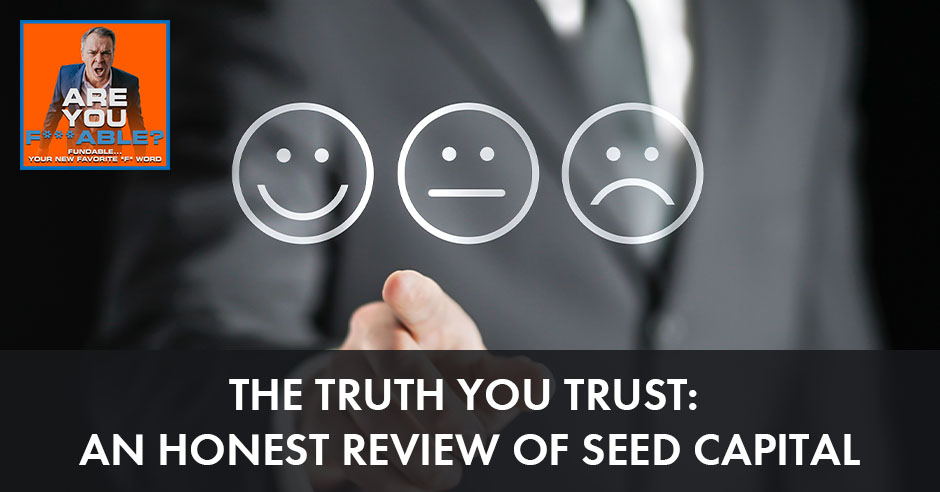
If you’re starting a business and looking for funding, it’s easy to be lured by the promises of Seed Capital. In this episode, Merrill Chandler exposes one of the most of the notorious credit card stackers out there. He presents a Seed Capital website review and goes through every misinformation and misrepresentations intended to confuse you and entice you to pay them to destroy your credit profile for good. Be a professional borrower, not a victim. Equip yourself and know the rules of the game.
—
Watch the episode here
Listen to the podcast here
The Truth You Trust: An Honest Review of Seed Capital
This episode is one of my most hardcore. I make a stand for borrowers who do not yet know the rules of this game. I take on credit card stacking by one of the most notorious credit card stackers out there, Seed Capital. I call it like it is. I review their entire website. You’re going to be able to see, listen to, hear and read at GetFundable.com. You’re going to be able to review the misrepresentations, the misdirection and some outright lies that are being promoted in the marketplace to the borrowers because in good faith you are looking for business funding. I give them all an option. I say either they know the rules of the game and they are straight-up lying out their ass to you to take advantage of you and to profiteer off of your ignorance or they don’t know the rules of the game. They’re too dumb, too stupid or too ignorant to want to engage the truth and to protect your best interests. Without further ado, take a look at this episode. You do not want to miss it. It is hardcore. I even challenged the CEO of Seed Capital to come onto my podcast and defend their business practices.
—
Welcome to one of the long-awaited episodes of Liars, Cheaters and Thieves, where we do a complete unmasking of Seed Capital as a “startup capital funder.” We’re going to go through their language on their website. We’re going to take a look at what they’re saying, what they’re promoting, what the truth is behind their words and at least give them an opportunity to answer back and answer one or two questions. Do you not know the rules of this game and you’re just ignorant? Do you know the rules of this game and you’re just taking advantage of every single borrower out there? An individual who’s looking to fund their business but doesn’t know the rules of the game. You’re totally forgetting your fiduciary responsibility to take care of your customers. As a result, you’re profiteering by the destruction of their credit profiles, their borrower profiles.
What Seed Capital Is All About
Before we get further into this, let’s take a look and see what they’re all about. First thing’s first, here’s a mocked-up version of their page. Go there and you’ll see for yourself about funding program, prequalified, get prequalified clients, FAQ and context. They’re all here in one long line. We’re going to go through them together. First of all, they have a marquee that rotates every one of them that says something similar to the fact that, “We’ve fueled growth for over 20,000 startups.” It sounds fair enough as a description. Some people may know how to use their personal credit profiles to succeed. We have dozens if not hundreds of clients who come to us after going to Seed Capital who have butchered their personal credit profile. They killed their funding golden goose, thrown a wrench in the business funding machine, any number of metaphors. They left these clients devastated with high debt loads and horrible unfundable credit profiles and scores and literally left them to rot after having worked with them.
This looks nice. We’re going to put our entrepreneur hat, small business owner hat, a real estate investor hat, “We fuel growth.” “I want to keep reading. This is awesome.” It says they’ve raised over $2 billion since 2008. “Raised,” the language is intentional. They didn’t raise this money. Raised means you go out to usually equity partners, equity investors and venture capital groups. You raise money as an agent like the corporate officers go out and talk to investors to invest in your company. You’re raising capital, not getting into debt. Much of it is equity but even if they’re raising capital in debt instruments, it’s not credit card debt from commercial lenders. This is a complete misdirection. This is a horrible representation of what’s going on here.
I’m going to put some exclamation points here because this is straight BS. They don’t raise money by any definition of the term raised money in financial circles. They are applying on your behalf and getting personal credit cards. This is a lie, but it sounds good, “If they’ve gotten $2 billion, maybe they can get me some money too.” They’re not getting you money. They’re applying on behalf of you to get credit cards. “Funding a startup is one of the most difficult challenges that many entrepreneurs face. Having personally funded over a dozen startups, the Seed Capital team knows how difficult it is to secure funding.” Once again, they’re using the terms not, “Get credit cards.” They’re saying they’re using true investment banking investor relations language, then Seed Capital’s mission is through innovative funding. It’s innovative all right because it’s not even remotely close to raising capital. Their owners may have parts of their organization or otherwise, that do reach out and get investments, but the vast majority of their customers are individuals who are at real estate investment conferences. Internet marketing conferences and they’re watching big stages.
Seed Capital’s mission is “innovative funding.” It's innovative because it's not even remotely close to raising capital #GetFundable Share on XSomebody says, “We’ve got a funding mechanism so you can pay for this class. Go to the back of the room, make a simple application and we can get you money for this class.” When they go to the back of the room, they fill out. What you’re doing is you’re filling out a master application that Seed Capital’s reps will use to qualify you for personal credit cards, not investment dollars. The first thing they want you to do when you’re at one of these conferences, one of these seminars is to go to the back of the room and get more credit cards so you can buy the program that’s being presented to you. I have nothing against the pros and cons of whatever program, buyer always beware. Whatever program you’re looking to invest in, I’m talking about how you’re funding that investment. Whether you’re a real estate investor, whether you’re looking for capital for your business, whatever you’re looking for, I’m talking about Seed Capital is straight-up lying to you and miss directing what is happening when they help you get funding.
Here we are, innovative funding meaning let’s go butcher your personal credit profile and get you in so much a personal credit card debt that you can then use for your business. There are credit building techniques. I’ve never had one of the clients who have come to me after being with Seed Capital never who said, “They have credit building techniques.” I’m not saying that they don’t, but I’m saying that the credit building techniques if all of this stays in line, they are not going to have to protect your personal profile in mind. This episode is also calling out to the CEO of Seed Capital to come onto my podcast. Come and sit down with me and let’s talk shop.
Let’s get down and dirty. I will be sending a formal request to him. I’m calling it out in person that we have this conversation in a podcast form so that we can interview each other about the truth of what we’re doing. Notice what it says, “Credit building techniques by providing cash credit lines.” The formal definition of a credit line is a line of credit that immediately begins to charge interest the second you use it. It’s like a credit card, except it has generally lower interest rates and the interest starts the second you use it. Generally speaking, that is a credit line. Credit cards can have zero interest. Credit lines never have zero interest. There is not a credit line out there that has zero interest. Credit cards do have promotional periods where 12 to 24 months there’s zero interest.
When they send messages that you can get zero-interest loans from lenders, they’re talking about zero interest credit cards that are on your personal. Notice how sexy the language is, “Cash credit lines,” that sounds compelling. They’re moving me through their marketing like, “I would like some cash credit lines.” I’d like to be able to write a check and do a deal, except that’s not what happens. Just read the language. It’s compelling if it were true. About us, “Our founders have started or been Angel investors in ventures.” Once again, they’re leveraging the history. I don’t doubt the history of their partners or the founders. I’m saying that they’re using language about getting capital in order to bait and switch to turn this $2 billion in funding into credit card debt. Personal credit card debt that when charged up anything over 7% as you are learning in our podcasts, as you’ve seen before, anything over 7% on the personal profile is a negative indicator to FICO’s measurement metrics. Notice it says, “We also offer valuable consulting experience.” I don’t know about their valuable consulting experience.
What I do know is there’s not one single client that I have run into the coming from Seed Capital for me to help them climb out of the hole that they’re in. Not one of them had any kind of valuable consulting experience. The consulting experience sounds like they would coach you on the protocols for use of personal credit profiles. That’s not so. That is not happening for literally the dozens or hundreds of clients that I have. I say dozens or hundreds because we have gobs and gobs of clients that have had the credit card stacking experience. I use credit card stacking in this way because credit card stacking is the formal term that is used when you go out and you get a bunch of credit cards, usually applied foreign in one day so that you can fly under the radar. Before this episode is over of Liars, Cheaters and Thieves, we’re going to talk about the 5/24 rule and where all of this is going away, that FICO’s Falcon for fraud detection, the early warning systems, every single database and predictive analytics in the market are cracking down on this very behavior. I’m hoping that we get to say bye-bye to credit card stacking and every person and organization who does it.

Exposing Seed Capital Fraud: Seed Capital entities have left their clients devastated with high debt loads and horrible unfundable credit profiles and scores.
The Seed Capital Program
Let’s look at the Seed Capital program. Notice, fear trigger, “To realize their dreams. Entrepreneurs give away precious equity to finance their companies.” That’s true if that’s true. “Unfortunately, selling even a small percentage of shares to an investor can change the power structure.” That’s not true. If you have over 70% interest, there is no voting block that can even block you, but we won’t even go into a corporate politics and shareholder, proxy meetings, etc. Notice “That can cause you to lose control of your vision.” See the emotional language is being used. You don’t want to lose your vision. “You don’t have to give up ownership for startup funding.” Notice, startup funding, put on the credit card your startup. That’s not what they’re telling you here at the beginning, but they’re weaving this beautiful language.
“Seed’s vast experience and knowledge with startup funding will allow you to keep all your equity and still get the capital to grow your business right now.” What they don’t tell you is you’re getting personal credit that you can then use for anything. It doesn’t even have to be for your business. You’re getting a credit card like going out to Wells Fargo and getting a $5,000 credit card. That’s all they’re doing on your behalf. They’re just going out and getting credit cards. As we go through this, let me make sure I’m completely out of the way. The next thing is let’s look at again, fear-mongering. “You already have a business. Did you know that 80% of businesses fail due to undercapitalization? Will your business be positioned to respond to constantly changing market dynamics? Seed Capital will help you in the development of funding options.”
There are no funding options. They’re going to get credit cards for you that report to your personal credit. You can have too many credit cards. You will use that credit too fast. Lenders will shut you down or they’ll make the 0% interest go away immediately or they’re not even going to approve you at all because of the 5/24 rule. “The credit lines or business loans,” it doesn’t say business lines of credit here because that would be pushing the misinformation too far. “The credit lines or business loans are underwritten and qualified for wholly on the borrower’s credit rating.” It doesn’t even say owner, “The borrower’s credit rating and stated business information.” Most of the time, if they open up a credit card, most of it is 100% on your personal profile. If they go outside of their narrow focus, then they may do something on a sole proprietor, which in every legal version of corporations and legal entities is an alter ego for the person.
They’re messing with the language. Let’s take a look here. “Phase one is to review the client’s personal credit report and see if you can qualify for the $50,000 guarantee.” That sounds awesome, but they’re looking at your personal credit report. Why? Because they’re going to be getting your personal credit cards. Notice what it says here in phase two. “Phase two features applications for unsecured revolving lines of credit that can be used for any purpose the business owner deems necessary.” It doesn’t have to be the business owner. You don’t have to own a business to go to Seed Capital and get startup capital. They’re just going to hit your personal credit profile and get your personal credit cards. “Feature applications for unsecured revolving lines of credit.” It doesn’t say that this is true. They are unsecured because they’re credit cards.
They are revolving because they are credit cards. They are not lines of credit because they’re credit cards. It doesn’t say business lines of credit. I just got $75,000 from Wells Fargo in the last 30 days. $50,000 of it was on a business line of credit. It doesn’t report to my personal. It only reports to the business. The other $25,000 was a business credit card, not a credit line. I got a credit line. There’s a business credit card. This is neither one of those. Listen to the language. It’s an unsecured revolving line of credit that can be used for any purpose because it’s not in the business. It doesn’t have the business name on the credit card. It doesn’t have anything. I’m telling you my experience of every single client that’s come to me from Seed Capital. They may have that.
If you're a Seed Capital client, you need to ask them what amount of income due they are putting on your application #GetFundable Share on XI’m happy to give a disclaimer. I would love for it to be 99% of their business. They may have a small percentage of their business where they help with business credit lines, but it takes more time. It’s a devoted process to get true business lines of credit. What do they know? They know that they’re helping all of these real estate investment stages. All of these seminar companies have them at the back of the room or someone like them. Seed Capital is not alone. We’re going to be doing Liars, Cheaters and Thieves episodes on numerous of these credit card stackers, even ones that purport to do business. I’ve got case study after case study to be able to do this. For Seed Capital, I didn’t need a case study.
It says right here on the language of their website. Unsecured revolving credit cards that report to your personal credit profile can be used for any purpose the business owner deems necessary. It’s really an expansive language. It sounds really sexy. I’m just telling you it’s not true at all. Let’s go down here, “Get pre-qualified in 60 seconds. Do you qualify for the $50,000 guarantee? We guarantee at least $50,000 in cash credit lines or a program is free. The program is not based on income. It provides unsecured credit and startups are okay.” It’s not based on income because it’s a stated income. It’s a credit card application. You put an amount in the annual income, it goes through automatic underwriting and they know the parameters.
I don’t know this. If you’re reading this and you’re a Seed Capital client, you need to ask them what amount of income due are you putting on my application. Whether the practice is still the same or not, give them the benefit of the doubt, they fill out the applications and submit them for you. You give them a power of attorney to fill out the application for you. Do you know what amount of income that they’re putting in that stated income application? Are they lying on your behalf and possibly getting you in trouble for fraudulent applications? We have other episodes in our podcast, where we talk about how FICO Falcon and the other databases out there, the fraud detection units out there are looking for variations in how much your income is on an application.
They’re checking the application last year with the application this year to see what variation there is in income. Are they lying on your behalf? You need to ask these questions because if you’re not filling out the application and submitting, somebody else is doing so. It’s against the cardholder agreement for someone to fill out an application on your behalf, even with a power of attorney. When you hit submit, you’re affirming every one of those data points is true. Cover your asses because it’s not good. Then notice, “Find out instantly how much capital you can access.” They know the personal credit card space, but the problem is your personal credit card space is the goose that lays the golden egg. You’re killing the very thing that is going to provide you with funding for the rest of your life.
The FAQs
Let’s go down to frequently asked questions. “Can my business be organized as any type of business entity?” Here’s where they either don’t know which makes them idiots and irresponsible in this space or they do know and they’re just lying through their teeth. “You can use sole proprietorship, LLC, S-corp or C-corp.” Let’s get our terms straight. Sole proprietorship and LLC are the only real words in here when it comes to the definition of an entity. They missed one. It’s called a stock corporation because S-corp or C-corp are federal tax designations, not types of entity within a state. There is no such thing as an S-corp in a state.

Exposing Seed Capital Fraud: Seed Capital promises “unsecured revolving lines of credit” which refers to credit cards, not a business line of credit.
You have an LLC or a stock corporation, an Inc., and then you file federal tax papers to be taxed as an S-corp or C-corp. Either they don’t know or they’re blowing smoke up behind quarters because there is no such thing as an S-corp. It makes me angry. Just so you know, this sole proprietorship is telling you sole proprietorships are alter egos. In my vast 25 years of experience, I am unaware of anybody filing under a sole proprietorship that got true business credit. On the application, they ask for your Social Security number, not an EIN. If they do ask for an EIN, it still goes on your personal credit. The account is listed on your name because a sole proprietorship means, “I’m Merrill Chandler doing business as XYZ company.” Merrill’s Marauders.
This is transparent. If you got sued as a sole proprietor, it goes straight to you. There’s no corporate bail, there’s no asset protection, there’s nothing. There is for an LLC, but they’re not going to set up an LLC for you. Notice you can use a sole proprietor, an LLC or S-corp, but how are banks prefer to lend to individuals that have formed these LLCs or corporations? They’re telling you they want to lend to you, without telling you that it’s going to be a personal credit debt, not a business credit debt that ends up on your personal. The $50,000 business lines of credit that I got and $25,000 from Wells Fargo in a business credit card, if I don’t pay them, they are going to end up as collections and debts on my personal profile. They will hit my personal profile because I’m the personal guarantor. I am it, but it does not report as a credit account in my revolving account’s portfolio because I know that I want to build true business credit and not kill the profile by having too much available credit on my personal side or too many revolving accounts. There is a FICO indicator. There’s a negative indicator that says too many accounts and there are also too many accounts in too short of time.
This is all straight BS, “Forming a business entity shows the bank that you’re serious about your new venture and you take the legal steps to legally protect it.” They don’t care. This is gobbledygook. They’re putting it on your personal profile. Even if you have an LLC, they’re going to be putting it on your personal profile. Let’s go to misdirection. What are the minimum requirements for a business to become a client? There are no annual sales minimums to become a client. The Seed Capital program is not income dependent. Are you seeing a pattern here? They’re saying, “On a stated income, a personal credit card application, you never have to have sales in a business.” They’re implying that because they’re trying to sell you as a startup company, “I can get you business funding.” What they’re saying is “I can get you personal credit cards that report to and ruin your personal credit profile and then you can use that money for your business.”
If that was said at the top of the page, we would not be having this conversation, “I can get you personal credit cards that you can liquidate those limits. When you liquidate those limits, you can use that money for whatever you want.” What they’re not telling you is when you liquidate those limits, your utilization, your balance to limit ratio goes through the roof. When it goes through the roof, your credit score plummets. Your fundability™ goes to zero and you’re counting on that 12 to 24 months zero interest. That zero-interest has stipulations. You get to keep zero interest if you don’t charge too much too fast. The whole point of getting these credit cards is that you can charge them up to buy the education programs at the back of the room or go fund different aspects of your business.
Every time you take a balance above 7%, don’t listen to those people who say, “As long as you don’t charge 30%, you’re fine.” It’s varying shades of charcoal gray to black after 7%. I’m just telling you. You have the experience. You’ve seen what happens every time you use it. We won’t even get into the different credit cards that are out there. They may say, “Let’s get you a Capital One Spark card. That says business on the marketing and business on the credit card, but it also reports to your personal. When it reports to your personal, every time you use it, it affects your personal profile. That personal profile then crushes the soul of your fundability™.
Credit cards can have zero interest. Credit lines never have zero interest #GetFundable Share on XLet’s look over here. This one is a huge misdirection. It’s so funny. “The CEO’s credit score is by far the most important aspect, but at least one of the partners in the business should have a credit score of 680 or higher. Banks believe if you have been vigilant in achieving a high personal score, it’s likely you’ll apply the same financial responsibility to your business.” It doesn’t say, “Apply the same financial responsibility to our business credit accounts.” It says that if you’re responsible on the personal. Here’s the thing, they’re relying on your ignorance of how the funding game is played, especially the business funding game. Did you know that most banks, business lenders out there require a minimum of 70% to 90% ownership of an entity to get only one person to backstop the business credit line or credit card? Some say 51%. There are some 51% or more, you can have one owner on this. We talked to Regions Bank, we are talking to an Atlanta office and they said that any owner above 25% must be on the business credit application, whether it’s a credit card or a credit line. That blows it out of the water because now, two people or three people are required to get this credit card. They don’t do that. This is all malarkey, BS alert.
There’s even another one, “Is there any risk or negative impact on me or my company?” See how they dodge this bullet. I want the CEO of Seed Capital to answer me this complete bullshit. “The owner of the business will have inquiries there,” negative risk, negative impact. “The business owner will have inquiries to their personal credit report.” That’s true. “Those can have a negative impact on the personal credit score for up to six months.” That’s complete bs. That is a lie. FICO calculates it against your score for a minimum for twelve months and it counts against underwriting for lenders underwriting software for 24 months. It counts against FICO scoring. You’ll rebound after twelve months, but underwriters are going to count every one you’ve done.
My clients, my students, all of you who do this with me, you know there’s a 24-month lookback period. The lending software measures the impact of your credit for 24 months. That is a complete lie. Here’s what they say, “If you carry high balances on credit lines that report to your personal credit file, your scores will be negatively affected.” They think that putting this at the end of their Frequently Asked Questions, they think that’s enough because this is true, but it cross-purposes with what they’re saying what you can do with those credit cards. They’re selling you, “Charge them up and use the cash.”
They even still say credit lines. They don’t say credit cards. All those credit lines, they’re credit cards. They may say, “If you carry high balances that report to your personal credit profile, your scores will be negatively affected.” Their thinking they can dodge bad juju bullets by putting that statement. While true, it completely cross-purposes with what they’re marketing. They want you to come to them, pay them $2,500 to $3,500 to go out and burden your personal credit profile with personal credit cards. I’ve clients come to me with 27 of these puppies on them. It burdens your personal profile with credit cards. That’s like throwing a millstone around the neck of your goose that lays the golden eggs.
Your personal profile is the goose that lays the golden eggs. I make sure I don’t have any other things down here. If this hasn’t been brutal enough, then I don’t know what is. Here’s what we’ve got to watch for. Credit card stacking by any company is burdening your personal credit profile. There are numerous FICO negative indicators that you get hammered for when you do. You’re going to lose or significantly lower your credit card if you charge it up. Most people get the credit card and then they charge it up immediately within 30 days. That is not how you’re supposed to do it. Secondly, if you carry long balances at the beginning of a new relationship with that lender, they’re going to close your card or they’re going to lower your limits.

Exposing Seed Capital Fraud: Seed Capital wants to get as many credit cards approved on your profile because they collect 5% or 10% of how much you were approved.
I’ve had clients come to me and say, “Every single time I make a payment, they lower my limit.” Some have had a $15,000 balance and they lowered the credit card limit to $5,000. It’s literally 200% more than the limit. Do you realize FICO crushes your fundability™? It crushes your FICO score calculations when you’re upside down, when your balance is higher than your limit. We even asked them when I was back at FICO World. I said, “Do you account for lenders lowering a limit?” They said, “No, we want to know because there is a bonafide lender reason for lowering that limit. The increased risk, susceptibility to fraud or default, they’re going to lower that limit. If you’re upside down, if you’ve got a balance that’s more than your limit, then FICO is once again crushing your personal profile.
The 5/24 Rule
Let me tell you about the 5/24 rule. I promised I’d tell you about the 5/24 rule. FICO’s Falcon fraud detection system is a collection of 9,000 banks that feed borrower data to this central clearinghouse. It’s not the credit bureaus because it’s application data. Credit bureaus collect creditor payments and creditor account information. The Fico Falcon and the application software collection process is not subject to the Fair Credit Reporting Act because they’re just sharing it among themselves. You’ve given them information on an application and they collect it.
The 5/24 rule says that any participating bank will be notified and will deny any application where there have been five credit card approvals within the last 24 months. Seed Capital and every other credit card stacker out there want to get a minimum of five. They want five, ten or fifteen of these because you pay them a percentage of their success. Let’s cover what it’s costing you. We’ve talked about a beat-up horse. The dead horse is that you ruin your personal profile and you kill your fundability™. They want to get as many credit cards approved because depending on your program, they collect 5% or 10% of how much you were approved. If you get $100,000, you’re going to be paying them $5,000 to $10,000 to get that hundred and that hundred when used, ruins your credit, ruins your funding possibilities, ruins everything about your funding future until you get all those things down to zero. Even if you pay them all off, even if you have a windfall and you pay off all those credit cards, the 24-month lookback period has this huge spike in the 24-month lookback period that FICO monitors for the next 24 months.
For deeper dive on all of this, find our podcasts. You can also go to GetFundableBootcamp.com and check out our boot camp. That boot camp is two days of revealing all of the things that are going on. We’re talking about one little tiny thing about your fundability™. GetFundable.com, click on the Boot Camp button and find out what we’re doing and come and join us because the only question that matters is, “Are you fundable?” This is a perfect example of whatever level of fundability™ you were, you lost it by working with an outfit like Seed Capital or any of the other credit cards stackers,
5/24 rule, FICO is tracking all of those credit cards for 24 months. If you violate the terms and conditions of that 0%, they’re going to start charging you interest or they’re going to lower your limits below the balance levels. It is a loss and yet a win for Seed Capital because they’re going to charge you that 10%. The final loss is that once they’ve charged that 5% to 10% to you to get that $100,000 in credit line, you’re out $10,000 right there. You got balances churning already, they send you to a third party. If you want access to that capital, if you want to do what they say, then they send you to what they called a liquidator.
Your personal profile is the goose that lays the golden eggs #GetFundable Share on XThey liquidate your credit card limits by charging them up. It’s against every merchant account policy in the universe for you to not buy something, but under the guise of service. These guys will swipe your cards and charge up all of those cards to predetermined limits. They’re going to ask you 50%, 70%, 100%. If it’s above 7%, you’re screwed. They’re going to say, “How much do you want, 50%, 75%?” People are like, “Yeah, 30. I want to be conservative.” Your score only drops 30 or 50 points instead of 100 and it’s brand new cards and all the other penalties will come into play. These liquidators were also charged a minimum of 5% to 10% to access all the capital. I’m going to bet you right now and I do not know this.
When I’m sitting here in a podcast with the CEO of Seed Capital, I would love nothing more than for him to say that we are not related to the liquidators. We don’t make a dime off of the money they charge. That would be a tiny minuscule. I believe it’s just another organization that’s related to Seed Capital or any of the other credit cards stackers. Every time you charge up those balances and they swipe those cards against every merchanting account game out there, because you’re swiping for cash, you’re not buying a product or a service, no matter what their paperwork says. I have a merchant account. There are rules behind this merchanting process. They swipe all your cards to the predetermined balances and they charge you 5% to 10%.
You might be into this 10% to 20% of that $100,000. It just went out of the door and you’re carrying balances. Now you’ve got and let’s say you went up to 50%. Now, 50% of the balance is you only have $50,000 and you only have $40,000 of it to use because you paid 10% to each of those outfits to get it. $40,000 may be beneficial. I’m not saying don’t do any of this. I’m saying, “What are you doing?” if you do choose to do it. Let me tell you about Chris and Nicole. They come to me in a monster pickle because they went to a real estate seminar. They went and did credit card stacking with Seed Capital at the back of the room.
They picked up a bunch of personal credit cards. They purchased the program and then they liquidated their balances. They took those balances and then they did a hard money loan to take down a property that they wanted to ultimately get long-term financing for. They’d used some of the money to fix it up so they could rent it and become a rental. What happened was the second they charged all those up, they took down the property with the hard money lender and their credit score plummeted into literally the low 600, completely unfundable.
They fixed the property. They’re doing everything right. They’re so proud of themselves for doing everything that their real estate coaches we’re teaching them. Except when it came to taking out the long-term financing, take out a Fannie mortgage, they couldn’t qualify because their utilizations were so high. They had to keep paying high interest to the hard money lender because they couldn’t get qualified for the takeout mortgage that would make all this work for them. They didn’t know the rules of the game. I’m telling you, don’t do it because so many times people come to me after the fact saying, “My deal didn’t happen fast enough. It would have been worth it if the deal happened fast enough.”
If you want more information, go to GetFundable.com, click on the Boot Camp. Find out more information and watch the free presentation there to walk you through all of this stuff. There are resources that you could do free of charge. Just find out what the rules of the game are and learn how to play and become a professional borrower instead of a rookie amateur, someone who doesn’t know the rules. These MFs are going to take advantage of you because you don’t know the rules. As I say with every Liars, Cheaters and Thieves episode, shame on you. Shame on you, Seed Capital, for either not knowing the rules yourself and being too stupid to take care of your clients or for lying through your teeth to get their money and ruin intentionally their credit profiles. Shame on you. Thanks for reading.




